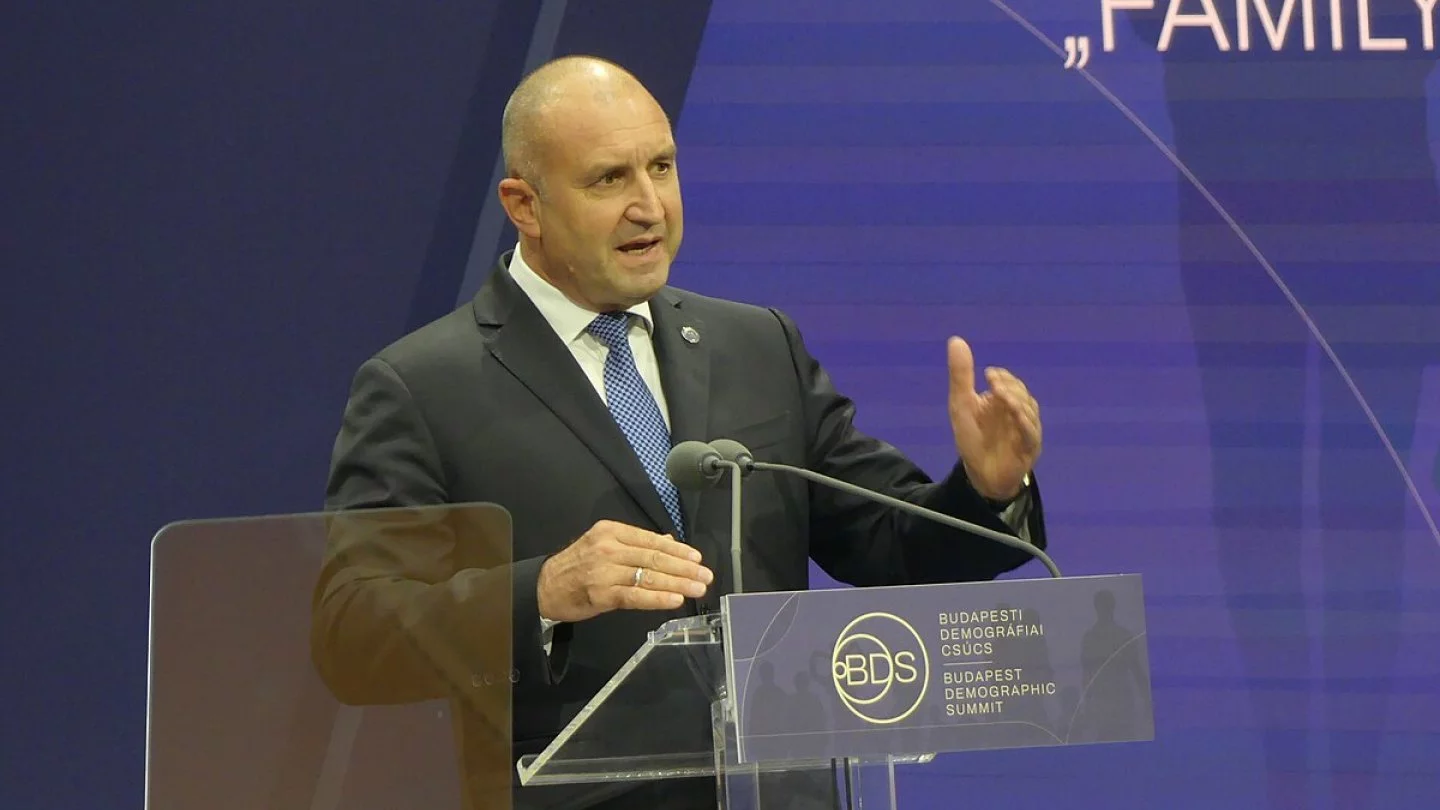Bulgaria: Radev Blocks Lukoil Asset Bill, Citing Constitutional Concerns
 English: Bulgarian President Rumen Radev at the Budapest Demographic Summit 2023. Budapest, Central Europe. Date: 14 September 2023, 11:57 Source: Own work Author: Elekes Andor Licensing: This image is licensed under the Creative Commons Attribution-Share Alike 4.0 International license.
English: Bulgarian President Rumen Radev at the Budapest Demographic Summit 2023. Budapest, Central Europe. Date: 14 September 2023, 11:57 Source: Own work Author: Elekes Andor Licensing: This image is licensed under the Creative Commons Attribution-Share Alike 4.0 International license.
Bulgarian President Rumen Radev has vetoed a bill that would have introduced new rules for the sale of Lukoil’s assets in the country, Orda.kz reports, citing BTA.
The legislation required all transactions involving the Russian oil company’s property to be approved by the State Agency for National Security (SANS) and the Council of Ministers — a measure intended to prevent the sale of the assets in a way that could ultimately circumvent sanctions.
Radev argued that the law would place the government in “functional and operational dependence” on the security agency, violating the constitution. He also said the legislation breached the principle of equality before the law, since it was effectively aimed at a single company.
The veto follows a new wave of U.S. sanctions against Lukoil and Rosneft. On October 22, the U.S. Treasury’s Office of Foreign Assets Control (OFAC) blacklisted both firms and 34 of their subsidiaries, accusing them of financing the Kremlin’s war machine.
Two days later, Bulgaria’s parliament adopted amendments requiring all deals involving Lukoil’s assets to receive state security clearance, according to The Insider.
The U.S. measures have raised the risk of foreign assets being frozen, including Lukoil’s Neftochim Burgas refinery and its chain of gas stations. Around 10 percent of the refinery is directly owned by the Russian parent company, while the rest belongs to European subsidiaries such as LITASCO SA, a Geneva-based trading arm wholly owned by Lukoil.
Through similar holding structures, the corporation retains control of most of its operations in the EU.
Radev’s veto could make the sale process less transparent and potentially open the door for Russian-linked intermediaries to acquire Lukoil assets under the guise of European entities.
Parliament can now either uphold the president’s veto or override it with another vote, writes The Insider. Until then, the previous rules — allowing sales without government or intelligence approval — remain in force.
Over the past two years, Radev has challenged multiple decisions by the government and parliament on energy and defense policy. In October, he appealed to the Constitutional Court to strike down a gas transit tax on Gazprom pipelines, claiming it infringed on property rights — a move that drew accusations from Prime Minister Nikolay Denkov and Finance Minister Asen Vasilev of defending Russian interests.
Radev previously halted the transfer of 100 Bulgarian armored vehicles to Ukraine, citing domestic security needs, but lawmakers overrode his veto twice.
He has opposed sending weapons to Kyiv, warning it could drag Bulgaria into the war. He also refused to sign a joint declaration by Eastern European leaders backing Ukraine’s NATO bid and threatened to veto EU sanctions targeting Russian nuclear fuel exports.
Although he condemned Russia’s aggression in 2023 and called for a peaceful settlement, Radev continues to insist that the war “has no military solution” and that Kyiv must seek negotiations with Moscow.
Latest news
- The War in Iran Opens a Window of Opportunity for Kazakhstan’s Oil Sector, Analysts Say
- Iran Conflict Escalates Beyond the Gulf: What Kazakh Experts Say About Risks for Central Asia and Kazakhstan
- Kazakhstan Prepares Possible Evacuation of Its Citizens From Iran
- LRT in Astana Is Reaching the Finish Line: The Launch Is Expected in the Coming Months
- Kazakhstan Ready to Help the UAE Amid Escalation in the Region
- Tokayev Discusses Middle East Escalation With Qatar’s Emir
- Airlines Ready to Bring Kazakhstanis Home From the Middle East
- Tokayev Sends Support Messages to Gulf Leaders Amid Regional Escalation
- Kazakhstan Bans Its Airlines From Flying Over Several Middle East Countries
- Astana Strengthens Security Measures Amid Escalation Around Iran
- Tokayev Meets U.S. Ambassador Stufft, Discusses Board of Peace Cooperation
- Mangystau Launches AI-Assisted School Monitoring to Prevent Teen Suicidal Behavior
- Kazakhstan to Supply UK With Critical Minerals
- AI Faculties for Educators to Open in Kazakhstan: What Other Changes Are Coming to the Education Sector
- There Are Medals — But Not Enough Ice: What’s Happening to Figure Skating in Kazakhstan
- Is Kazakhstan’s Nuclear Power Plant Project at Risk After New UK Sanctions? Rosatom Responds
- Prosecutor General’s Office Suspends Extradition of Navalny Ex-Staffer Detained in Almaty
- Former EBRD Executive Jürgen Rigterink Elected as New Independent Director on Bank RBK’s Board of Directors
- Kazakhstan Near Bottom of Retirement Comfort Ranking
- Kazakhstan to Open New International Flights Across Asia, the Middle East and Europe

